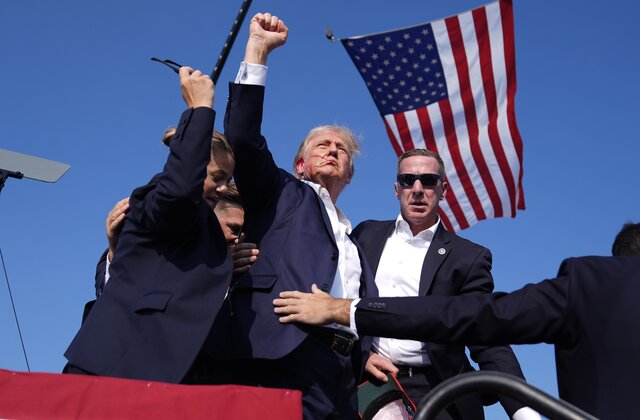In the recent election debate, former US President Trump completely defeated current President Biden, which attracted widespread attention. However, Trump subsequently encountered an assassination attempt during a campaign event. Although injured, the photo of him insisting on "keep fighting" in front of the media became the masterpiece of Trump's political career. Some people even compared the photo of him after the injury with the famous painting "Liberty Leading the People". This made his polls rise all the way, and almost everyone believed that Trump would become the next US president.


So recently, many media have begun to predict the possible new policies of the United States in 2025. Forbes website published an article titled "Pproject 2025 Explained: What To Know About The Controversial Right-Wing Policy Map For Trump—As RNC Kicks Off”, which details Project 2025. This is a project led by the conservative think tank Heritage Foundation, which aims to provide a policy blueprint for President Trump’s potential second term. This article will analyze the impact of these new policies on the United States as a whole and on Chinese people in the United States and Chinese students who want to go to the United States from multiple aspects, and finally recommend some alternatives to deal with possible impacts.
Analysis of the overall impact of the new policy
Immigration Policy
- Visa restrictions and screening: The Trump administration is likely to continue or even increase restrictions and scrutiny on visas, especially for students and workers from high-risk countries. This will lead to a more stringent and lengthy visa approval process, affecting the entry and retention of international students and workers in the United States.
- H-1B and other work visas: The Trump administration will further tighten H-1B visa policies, making it more difficult for international students to obtain work visas after graduation. The new policy may give priority to applicants with high-paying jobs and advanced degrees in the United States, which is disadvantageous to newly graduated international students.
- Student and Exchange Visitor Program (SEVP): SEVP supervision and enforcement will be further strengthened, including more frequent and rigorous inspections of students and institutions. In addition, policies limiting the length of students' stay may be reintroduced, requiring students to apply for renewal frequently.
education policy
- Abolition of the Ministry of Education:If the Ministry of Education is abolished, there will be major changes in the supervision of educational institutions, which may lead to administrative confusion and delays, affecting all international students, including Chinese students.
- School selection and funding allocation: The new policy emphasizes "school choice" policies, shifting public funds to private and religious schools, which may affect the funding sources of public universities, which are the main choice for many international students.
- Student loans and financial support: Halting student loan relief programs, including Public Service Loan Forgiveness and income-driven repayment plans, which will create financial strain on international students, including Chinese students, who rely on these programs.
- Transgender Rights and Diversity, Equity and Inclusion (DEI) Program: Eliminating DEI programs could lead to a less inclusive educational environment, particularly negatively impacting international students from marginalized groups.
Other policy impacts
- Tax and federal reform: The new policy may significantly reform the tax system and cut multiple federal agencies, which will have a wide-ranging impact on the overall economy and public services. The elimination of some key federal agencies, such as the Department of Homeland Security, may have a direct impact on the living and learning environment of immigrants and international students.
Special impact on Chinese in the United States and Chinese students who wish to study in the United States
Visas and Admissions for Chinese Students in the United States
- Visa restrictions:Visa approval for Chinese students will become more stringent, which may extend visa approval time and increase the risk of visa rejection.
- It is becoming more difficult to obtain an H-1B visa: The new policy may make it more difficult for Chinese students to obtain H-1B visas after graduation, especially for applicants for lower-paying entry-level positions.
- Changes in the educational environment: The elimination of DEI programs and restrictions on transgender rights could lead to a less inclusive educational environment and have a negative impact on Chinese students, especially those from marginalized groups.
- Student loan cancellation program:The new policy may stop the student loan forgiveness program, which will increase the financial pressure on Chinese students and may force some students to give up their plans to study in the United States.
- School Selection Policy: The transfer of public funds may lead to funding shortages at public universities, tuition increases, and financial pressure on Chinese students.
Working conditions of Chinese workers in the United States
- Visa review: Visa screening for Chinese workers will be stricter, especially in the technology and research fields, who may encounter more restrictions and scrutiny.
- National security concerns: Due to national security issues, Chinese workers may face more difficulties in obtaining security clearances and work authorizations, especially in sensitive industries.
- Impact of the technology industry:Restrictions on technology transfer and intellectual property rights may affect cooperation between Chinese and American companies and have an adverse impact on Chinese technology workers in the United States.
alternative plan
Study Abroad Destinations
- Canada:Canada is friendly to international students, has a relatively relaxed visa policy, and offers good job opportunities and immigration policies after graduation, making it an ideal alternative choice.
- Australia:Australia has high quality of education, is attractive to international students, and has a relatively relaxed immigration policy, which is suitable for Chinese students who want to study abroad and immigrate.
- European countries: Such as the United Kingdom, Germany, the Netherlands and other countries. These countries have high education quality, friendly policies for international students, and provide a variety of scholarships and job opportunities.
Work destination
- Job opportunities in Canada:Canada's technology industry is booming, there is a great demand for skilled workers, and it has a relatively relaxed work visa policy.
- Australia's skilled immigration policy:Australia has a relatively friendly immigration policy towards skilled workers and can serve as an alternative to Chinese workers.
Increase domestic education and employment opportunities
- Top universities in China:China's top universities, such as Tsinghua University and Peking University, provide high-quality education and have extensive cooperation projects with international universities.
- Development of domestic technology industry:China's technology industry is developing rapidly, providing a large number of high-paying job opportunities, which can attract more domestic and foreign talents.
In summary, the implementation of these possible new US policies may have a profound impact on Chinese and Chinese students in the United States, restricting visa acquisition, increasing education and living costs, changing the working environment, etc. To cope with these challenges, Chinese students and workers can consider other study abroad and immigration options, such as Canada, Australia, and European countries, as well as focusing on domestic education and employment opportunities. These alternatives can not only help them achieve their education and career goals, but also avoid possible policy risks.